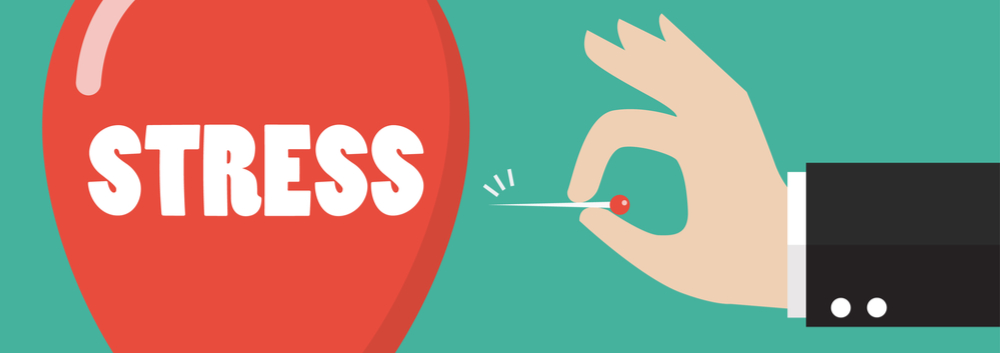Combating work place stress with Dr Dimitrios Paschos
- 7 Min Read
Stress is one of the main reasons for lack of productivity in the workplace, an issue that is costing the UK economy 45 million working days annually. Nationally, this is a crisis and something needs to be done to enable our workforces to be happy, with an aim to reduce stress going forward.
- Author: Emily Sexton-Brown
- Date published: Apr 12, 2018
- Categories

We speak with Dr. Dimitrios Paschos who is a psychiatrist about effective ways to truly combat stress and spread awareness companywide around the impact stress can have on employees.
What is the most common reason for stress you hear about among the UK working population?
Stress in the workplace is the most common form of stress in the UK.
 Gone are the days of working 9-5. The workplace is changing rapidly with new models of working evolving such as 0 hours’ contracts and gig economy, which may not be conducive to mental health or managing stress. Employees can no longer escape from work with smartphones, emails and social media making employees contactable 24/7. With no escape comes no respite or down time, which impacts on mental health.
Gone are the days of working 9-5. The workplace is changing rapidly with new models of working evolving such as 0 hours’ contracts and gig economy, which may not be conducive to mental health or managing stress. Employees can no longer escape from work with smartphones, emails and social media making employees contactable 24/7. With no escape comes no respite or down time, which impacts on mental health.
Factors such as economics, technology, social and environmental changes seriously contribute to workplace stress, alongside internal elements such as culture, structure, personnel, atmosphere and policies within an organisation.
Do you think line managers/leaders could be doing anything to reduce stress in the workplace?
It is important for employers to identify work-related pressure and seek counsel from experts regarding the implementation of a mental health policy in the workplace. This should include clear guidelines about identifying members of staff who may need help or be at risk.
Because there is a stigma attached to mental health, many individuals who are affected may try to keep quiet. They don’t want it on their record for fear of it leading to discrimination and affecting chances of re-employment. Employees should be made aware that they can talk to somebody in confidence and without potential negative consequence i.e to an independent counsellor. If mental health and severe stress is not addressed in the workplace, this will end up costing businesses more money in the long run in sickness absence costs.
Simple things employers can do to decrease workplace stress include:
- Shut down emails on weekends
- Reconsider the most productive way to delegate tasks and timelines
- Reduce work hours (finish early on Fridays!)
- Listen to employees, how can you improve the environment
- Active relaxation in the workplace
- Support people who are at risk or struggling
- Chill out rooms – a quiet zone to relax
- Team building or social activities – people will work harder if they feel they are rewarded
- Good employee benefits including options of flexible working, family policies, gym memberships and options of further training
- Encourage staff to take lunch hours and regular holidays throughout the year
- Rewards – acknowledgment of achievements to keep motivated
- Empower employees and include them in decision making processes to help shape the workplace
- Improve internal communications so staff are not kept in the dark
- Don’t overload with work or give unrealistic deadlines – ask staff for feedback on work
- Implement regular team meetings
Could you share any shocking stats, indicating that we are in a national stress crisis – one which needs to be taken seriously?
There are over half a million people in the UK suffering from work-related stress, depression and anxiety and 12.5M workdays lost as a result. Work stress is a growing problem in society and needs to be addressed on a wider level, from organisations through to government policies.
It’s National Mental Health Week on 14th May and the Mental Health Foundation have themed this year’s week around stress – why do you think they picked that theme?
Workplace stress is affecting such a large proportion of society and cases will only continue to rise if this is not addressed.
How would you advise the UK population to reduce stress?
Reduce stimulants such as alcohol and caffeine which increase stress. Instead, drink water or herbal teas to keep hydrated and enable your body to cope better with stress.
Exercise – this helps to metabolise the stress hormones – adrenaline and cortisol and restore calm in the body. Physical exercise also helps promote sleep.
Get a good night’s sleep – Sleep deprivation or sleep interruption can increase stress levels. Sleep helps our brains clear away toxins, plaques and proteins that build up throughout the day. Sleep also helps us to remember new things we have learnt, improves concentration, mood and metabolism, so it is vital we bank between 6-8 hours sleep each day.
Meditation is a great way to unwind, relax and clear the brain, helping to alleviate life stresses. Meditation reduces the level of the stress hormone Cortisol.
Don’t internalise, talk about your stress triggers – a problem halved is a problem shared. Sometimes just talking through a problem can help rationalise it and release tension; independent advice or can be very beneficial.
Don’t try to do everything yourself – enlist help where you need it. Don’t be afraid to delegate and ask others for assistance when you need it and don’t be afraid to say no.
Take a lunch break – Mental performance drops if we don’t take breaks; decision making becomes slower, attention levels wane and thinking can become more rigid. Taking a break can help clear the mind and provide clarity.
Make lists – outline the key focus of the day and week. Prioritise the work load and action from the most important. Delete any actions that are ‘nice to have’ and not necessary (or put them on a rainy day / nice to have list!)
Focus on one thing at a time – With so many distractions, from social media, newsfeeds, messages, phone calls and the barrage of emails, it can be hard to stay focussed and concentrate on one thing at a time. By having many things on the go, tasks don’t get completed thoroughly or with the optimum amount of attention. Try to unplug – put the phone on silent and only check emails once an hour.
Get social – Socialising helps to reduce anxiety and depression and improve mental sharpness. It’s important to establish and maintain good social networks and support.
Seek help – if you feel you cannot cope, your stress levels are unmanageable or your health is being affected, it is imperative you seek professional medical help. There are many treatments that can help manage and alleviate symptoms.
Do you think stress/anxiety should be openly talked about with this conversation being encouraged by senior management within businesses?
Stress and anxiety should definitely be addressed by senior management to ensure a happy and healthy workforce. Poor mental health has also been linked with poor physical health, so it is important that this is addressed at the earliest possible stage. The more open we are the more beneficial this will be.
How do you think the high rate of presenteeism can be combatted in the UK?
Being present does not necessarily mean being productive and this can promote an unhealthy culture, as well as an unhealthy workforce. Presenteeism mostly comes from the demands of the workforce or in response to employees feeling threatened about losing their jobs. It can also be the result of peer pressure, if others are working much longer hours it can feed into this culture. Management should encourage employees to adhere to working hours and support individuals through illness.
Improving productivity in the workforce by improving the health of employees is essential to combatting presenteeism, saving organisations money in the long term.





